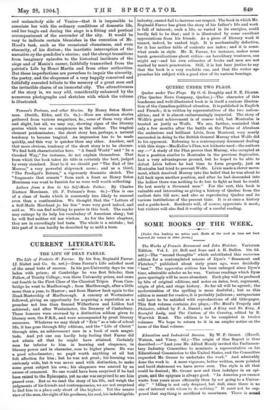C URRENT LITERATURE.
The Life of Frederic W. Farrar. By his Son, Reginald Farrar. (J. Nisbet and Co. 6s. net.)—Dean Farrar's Life satisfied most of the usual tests of success. In his pre-University days he was laden with prizes ; at Cambridge he was first Scholar, then Fellow, of Trinity College ; won three University prizes, and came out fourth in the First Class of the Classical Tripes. From Cam- bridge he went to Marlborough ; from Marlborough, after a little more than a year, to Harrow; and from Harrow back again to the Head-Mastership of Marlborough. A canonry at Westminster followed, giving an opportunity for acquiring a reputation as a preacher not less than Samuel Wilberforce and Liddon had achieved; and after Westminster, the Deanery of Canterbury. These honours were crowned.by a distinction seldom given to literary men, the F.R.S., and were accompanied by great literary successes. Whatever we may think of " Eric " as a tale of school life, it has gone through fifty editions, and the "Life of Christ" through nine, an achievement rare in a book of such magni- tude. And yet one can hardly help feeling that Farrar did not attain all that he might have attained. Certainly men far inferior to him in learning and eloquence, in literary power and in character, rose to higher places. He was a good schoolmaster; no pupil worth anything at all but felt affection for him ; but he was not great; his learning was curiously wide, but it was never used with distinction, to make some great subject his own ; his eloquence was marred by an excess of ornament. No one would have been surprised if he had been raised to the Episcopate, yet no one was surprised to see him passed over. But as we read the story of his life, and weigh the judgments of his friends and contemporaries, we are not surprised to find him in a place only short of the highest. Yet the nearer view of the man, the sight of his goodness, his zeal, his indefatigable industry, cannot fail to increase our respect. The book in which Mr. Reginald Farrar has given the story of his father's life and work is full of interest; such a life, so varied in its energies, could hardly fail to be that ; and it is illustrated by some excellent appreciations from his friends. As a piece of literary work it cannot, indeed, be ranked high. It is mechanically defective, for it has neither table of contents nor index; and it is some- what crude in style. Mr. R. Farrar, for instance, makes some harsh generalisations about critics—an hereditary weakness, one might say—and his own estimates of books and men are not marked by much penetration. Still, it is but bare justice to say that the book is a very readable one, and that the writer ap- proaches his subject with a good view of its various bearings.






































 Previous page
Previous page